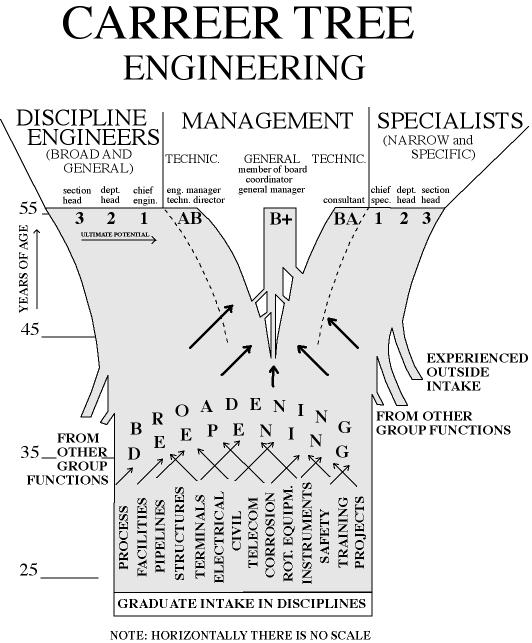


When talking about engineering careers it is unavoidable that certain jargon is used like discipline engineer or specialist or generalist.
A "D I S C I P L I N E E N G I N E E R" is an engineer that covers a large area in his discipline and does not act in his job as a specialist.
A "D I S C I P L I N E" is a field in which one has chosen to study and/or work. Examples of disciplines that cover a huge field are: Mechanical -, Chemical - and Civil Engineering. Also covering a large field, for instance in an oil company environment, are Offshore Structures-, Process-, Field- and Project engineering. Disciplines with smaller fields are Rotating Equipment-, Telecom-, Safety-, Instruments-, Electrical-, Materials and Corrosion- and Training Engineers. The work done in each of these disciplines has a high technical content and section and department heads are technical managers. Within each discipline people have similar education, but in time they have gathered different experiences in their field.
A "S P E C I A L I S T" is somebody that knows "sufficient" about what is going on in his discipline and may spend part of his time on general matters in his discipline, but has a superior knowledge about one or more specific subjects. In his specialist field he is the only one that has the answer "within kilometres distance". In each discipline there may be one or more SPECIALISTS. Examples are the one man in engineering that knows all about two-phase flow or about core flow or about wax in pipelines, or about control systems for turbines or on paint for tanks or negotiating with contractors, or on depressurising vessels or on glycol dehydrator operation or on reliability of equipment or on safety in exploration etc.
The word "G E N E R A L I S T" in my opinion should only be used for those people that have been chosen to go into general management i.e. in such positions where people from many disciplines and not only technical ones will report to him. A Chief Engineer is not a generalist, neither is a Technical Director. They are professional technical managers. General Managers and Directors are generalists and they all started as discipline engineers of some sort.
ON CAREERS:
An engineer should BEGIN IN THE DISCIPLINE HE ELECTED during his university study. It does not make sense to start a civil engineer in process engineering and a chemical engineer in the structures department. A DISCIPLINE can be very wide (field engineering) or cover a smaller field like (safety/ environmental engineering)
The engineer should STAY IN THE DISCIPLINE for some TEN YEARS because he can contribute most to the company in that field that was his own choice!! He should cover the full scope of the discipline and become more and more experienced in his field.
After this initial period the shape of the engineers career has become clearer and a period of broadening and deepening is required to stretch the individual to the limit of his capabilities. His abilities should now be tested in different engineering disciplines , and in leadership-, organizational- and management fields. Not only the level of technical knowledge but also the profile of a mans capabilities will determine his career path and ultimate potential.
Then in principle one goes either of the following routes described below to reach ones ultimate potential. This potential can be low but also high (see the tree). For each individual there will be a different route, of which the extremes are:
a. the experienced DISCIPLINE engineer without a true specialism and:
b. the SPECIALIST wholly dedicated to his specialism.
There are many in-between situations in which discipline engineers have specialist fields of knowledge. The choice is very much the choice of the individual.
To become the AUTHORITY in his specialism and be effective for the company the specialist must demonstrate initiative and helicopter view and volunteer to give advice where he thinks it to be necessary. To become the LEADER in their field (which means they can handle the more senior positions in their fields) both the SPECIALIST and the DISCIPLINE ENGINEER MUST MAKE SURE THEY ARE LISTENED TO.
For the few that have the ability and desire to go into general management there will be an accelerated programme of going through the process of broadening and deepening and they will be severely tested all along.
We should get rid of the myth that an engineer only counts if he stays in general engineering (whatever this may mean) or if he has run a major project, as managers will be selected from all disciplines , and remember:
A MANAGER IS NOT MADE BUT BORN!!!!!
Y O U W I L L B E C O M E A M A N A G E R I N C A S E Y O U H A V E T H E
A B I L I T Y B U T R E M E M B E R T H E R E A R E O N L Y A
F E W P L A C E S A V A I L A B L E A N D T H E R E F O R E T H E R E
W I L L B E R A N K I N G A M O N G S T T H E B E S T.
